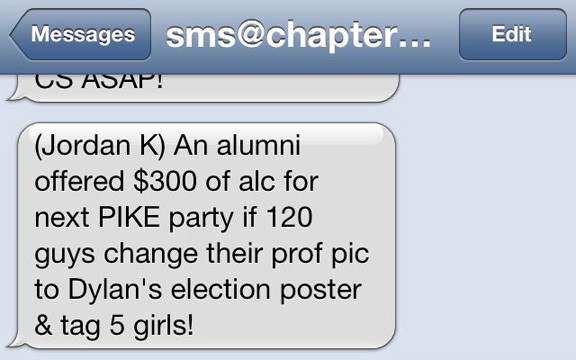An ASUA presidential candidate could face questions over a text message that circulated around a fraternity, offering alcohol in exchange for campaign support.
The text message was sent last week to members of the Pi Kappa Alpha fraternity and stated that an alumnus of the fraternity would donate $300 worth of alcohol to PIKE’s next party if 120 members changed their profile picture on Facebook to Associated Students of the University of Arizona presidential candidate Dylan Duniho’s election poster.
A screenshot of the text was emailed to the Arizona Daily Wildcat. The anonymous email sender alleges that the text was sent by Jordan King, external vice president of PIKE, though the text itself only says “Jordan K.”
King denied sending the text and said that many people have access to the messaging service.
“Although it would be incredibly unfortunate, I wouldn’t be surprised if one of the presidential opponents is behind this attempt to injure a member of our house who happens to be running for the position of student body president,” King said in an emailed response. “Myself, and the rest of my chapter, strives to stay above all that.”
Duniho, a member of PIKE, said he does not know who sent it.
“I have no idea who sent it out. I wasn’t part of it at all,” Duniho said. “I certainly don’t condone using alcohol to bribe anybody for anything and it’s kind of unfortunate that it happened. For me, I can’t pay attention to that kind of stuff. All I can do is keep focusing on my campaign strategy.”
According to chapter seven of the ASUA Elections Code, candidates may accept no more than $200 per individual contributor, and contributions must be reported to the ASUA Elections Commission. Presidential candidates have a campaign-spending limit of $600 altogether.
Duniho said he saw the text for the first time when it was sent to PIKE members and that it caught him “off-guard.” The fraternity has “almost like a listserv” messaging service, but alumni still have access, which makes it almost impossible to tell who sent the message, Duniho added.
As of yet, Duniho has not reached out to ASUA Elections Commissioner Leo Oppenheimer about the text but said he was open to meeting with him.
Duniho’s opposition, ASUA presidential candidates Anthony Carli and Morgan Abraham, both said they were aware of the text, but refuted King’s suggestion that it had come from one of them.
“I don’t know if it’s true or not. I’m not going to do anything with it,” Abraham said. “I can guarantee it didn’t come from me.”
Carli said he had heard about the text through friends and considered it a serious issue, but rejected the possibility it had come from Duniho’s opposition.
“I think it’s a little asinine to be throwing the blame game around,” Carli said. “Clearly, I’m not going to be collaborating with Morgan [Abraham] on ways to take down another candidate. I’m running my own race.”
Carli will probably request a meeting with Oppenheimer, he said.
“I really trust and hope that the Elections Commission will do an investigation into this because that’s a serious infraction of not just the Elections Code, but ethics, frankly,” Carli said. “I would hope that Dylan [Duniho] wouldn’t do something like that, or someone on his staff wouldn’t breach that level of ethics, but I would definitely like to see an investigation conducted.”
As of yet, Oppenheimer has not received an official complaint form. He refused to comment on the specific situation.
“We expect all of the candidates to conduct themselves in appropriate manners and any violations of the code will be dealt with according to the rules laid out,” Oppenheimer said. “When there’s any potential violation of any elections code rules, we do deal with it, mostly internally, with the candidates involved.”
If the text were verified to have come from a current PIKE member, consequences may extend beyond Duniho’s presidential campaign. The offer of alcohol in exchange for support could be an issue that concerns Greek Life, said Johanne Ives, assistant dean of students and director for Fraternity and Sorority Programs.
“That would be something that we would call the chapter president and talk about because that sounds like it could be problematic, if it’s true,” Ives said. “Sometimes in chapters that are large, presidents don’t always know about things like that. We’d start by making sure it was on his radar.”








